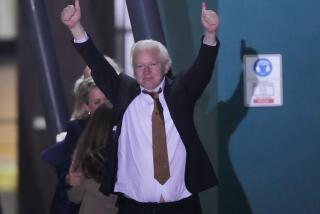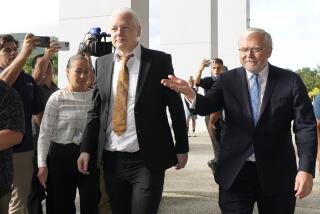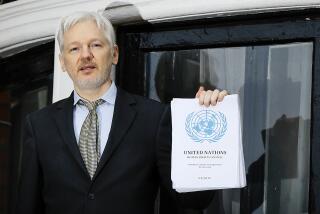WikiLeaks founder Julian Assange loses round in extradition fight
- Share via
Reporting from London — WikiLeaks founder Julian Assange should be extradited to Sweden for questioning and possible trial on charges of sexual assault, a British judge ruled Thursday.
Speaking to a packed London courtroom, Judge Howard Riddle said Swedish prosecutors’ request that Assange be handed over was valid and reasonable for their investigation into allegations that he sexually abused two women last August.
Assange, 39, denies the accusations. He has seven days to lodge an appeal, and his lawyers said they would do so, which would probably drag out the high-profile case at least another month.
Wearing a dark suit and tie, Assange looked impassive as the decision was read. Afterward, Assange denounced the decision as “a rubber-stamping process that comes as no surprise, that is nonetheless wrong.” His supporters stood outside the courthouse, waving signs proclaiming his innocence.
His appeal could eventually be heard by Britain’s high court.
“We are still hopeful that the matter will be resolved in this country,” Mark Stephens, one of Assange’s lawyers, told reporters.
Stephens said the ruling in favor of extradition was not a surprise, but added: “We have to remember that at this point Julian remains uncharged.”
Assange, an Australian national, has been in the international spotlight for months, since his whistle-blowing website released thousands of U.S. government documents on the wars in Afghanistan and Iraq and on American diplomatic communications around the world.
Assange maintains that the sex-crimes allegations against him are part of a politically motivated smear campaign. His lawyers also contend that extraditing him to Sweden would merely be a prelude to sending him to the U.S., where government prosecutors are investigating the possibility of espionage charges.
The accusations against him stem from separate encounters with two women in Stockholm last summer. They allege that he refused to wear a condom during sex despite their requests; one of the women also says he began having sex with her while she was still asleep and therefore unable to give her consent.
Under Sweden’s strict laws on sexual assault, those allegations amount to molestation and a form of rape, and could carry a prison sentence of several years.
Assange acknowledges having sex with the women but says it was consensual.
He surrendered to police in London in December after Britain received an arrest warrant from Sweden. After a brief time in London’s Wandsworth Prison, he was allowed out on bail, but only on condition that he spend his nights at a supporter’s country estate and wear an electronic monitor.
During his extradition hearing, his defense team argued that Swedish prosecutors did not have the authority to issue the European arrest warrant and that what Assange is alleged to have done would not count as serious crimes under British law. Assange’s attorneys also called a witness who portrayed the chief prosecutor in the case as a radical feminist with a vendetta against men.
Furthermore, the defense argued that Assange would not receive a fair trial in Sweden, where rape trials are usually held behind closed doors and where, defense lawyers said, adverse publicity surrounding the case would prejudice the outcome.
But the judge dismissed all those arguments.
Riddle said the arrest warrant was procedurally correct and properly issued. Having sex with someone while she was asleep “would amount to rape” in Britain, Riddle wrote in his 28-page judgment.
And as for the media attention and remarks in the press about the case, “I am absolutely satisfied that no such comments will have any impact on the decisions of the courts, either here or in Sweden,” Riddle wrote.
While he has been out on bail, Assange’s movements have been relatively unrestricted during the day, and he has had full access to the Internet. But on Thursday, he called the conditions of his bail excessive.
“Why is it that I am subject, a nonprofit free-speech activist, to a $360,000 bail? Why is it that I am kept under electronic house arrest when I have not even been charged in any country?” he said.
Assange has said that the work of WikiLeaks is continuing in spite of his “mansion arrest,” and he has come to London to attend events at the Frontline Club, a journalists’ hangout.
More headlines:
Toyota recalls 2.17 million more vehicles over sudden-acceleration problems
Suspect in wife’s disappearance leaps off cliff
Janet Stobart of The Times’ London bureau contributed to this report.
More to Read
Sign up for Essential California
The most important California stories and recommendations in your inbox every morning.
You may occasionally receive promotional content from the Los Angeles Times.











